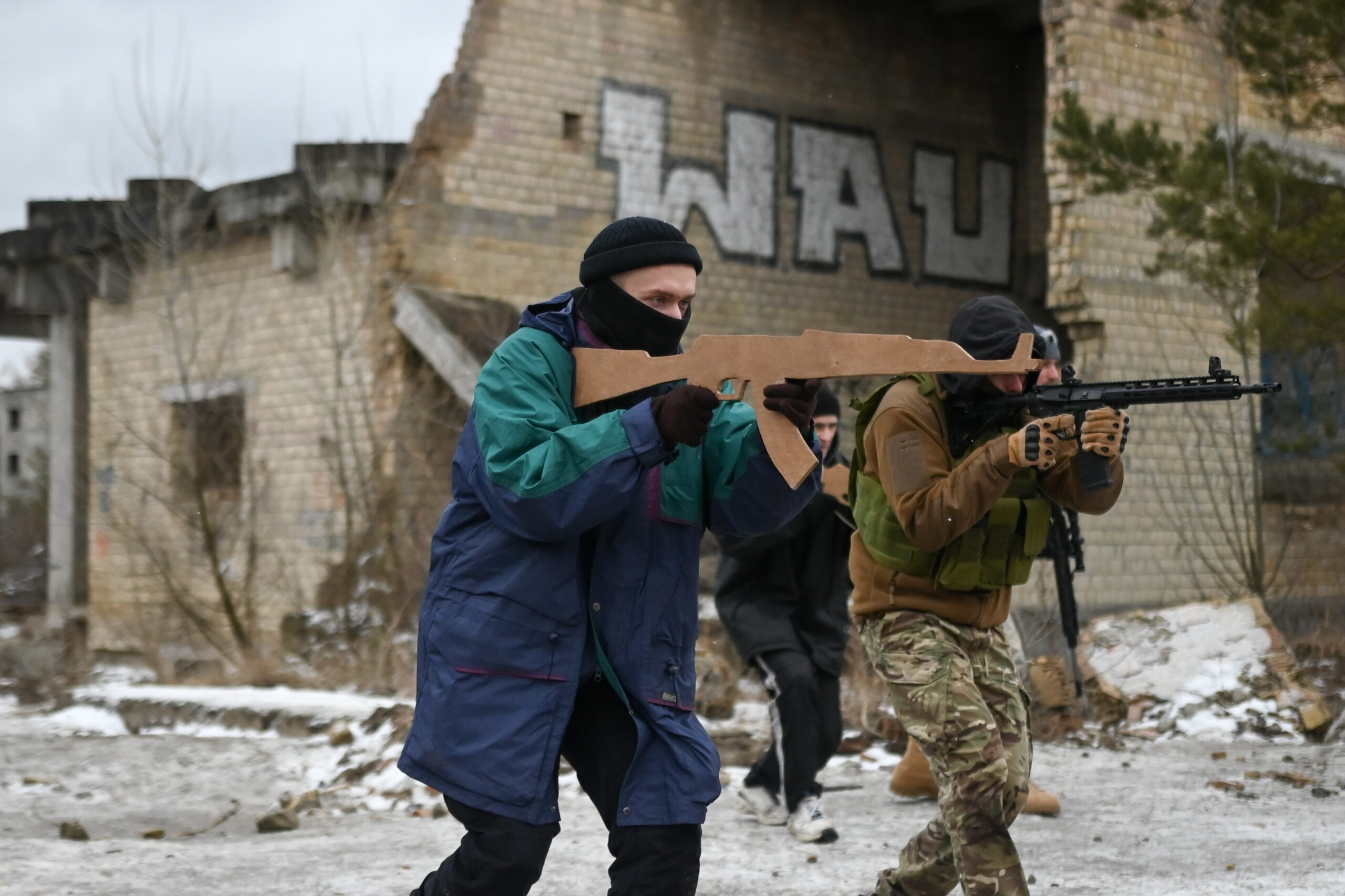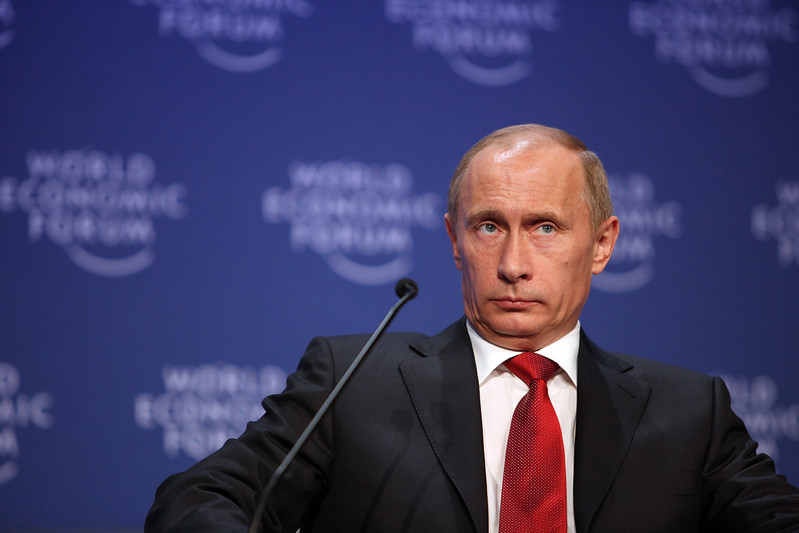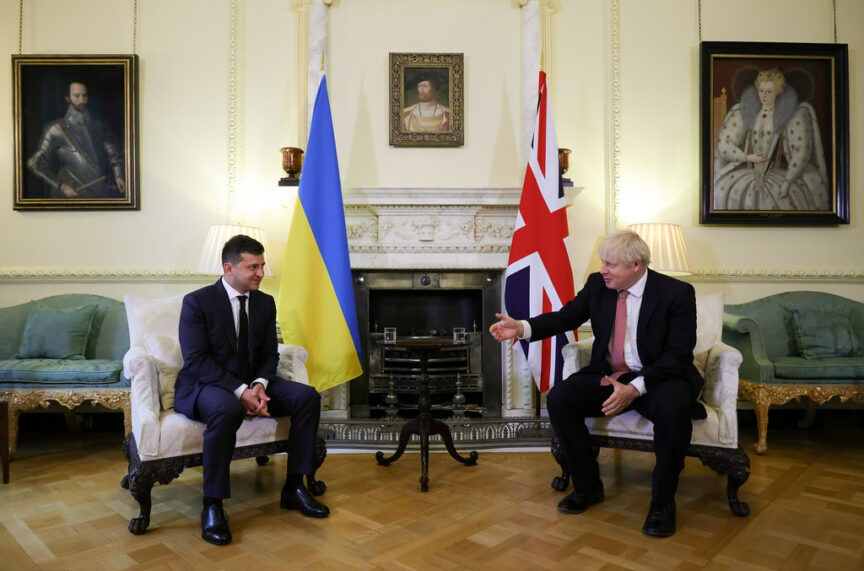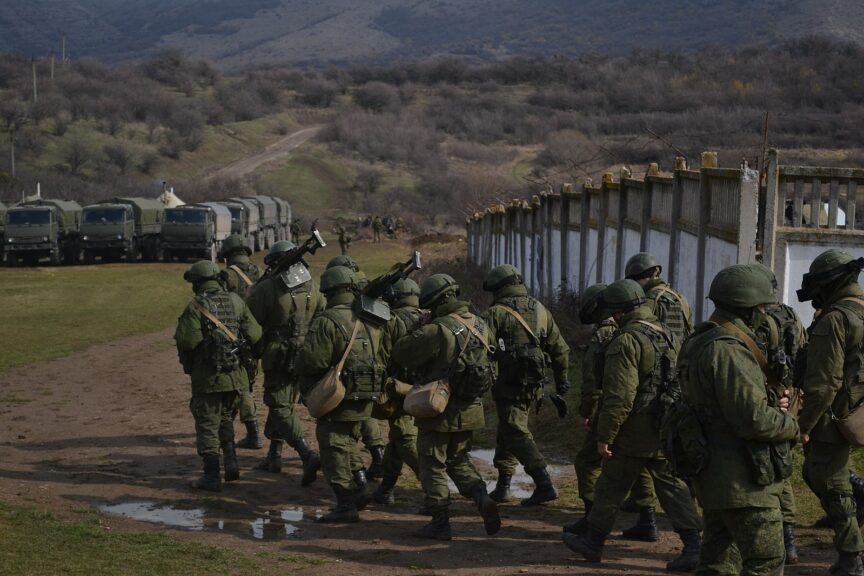Strategist or Opportunist: What is Putin Playing at in Ukraine?
The Kremlin could just be winging it.
by Volodya Vagner
2 February 2022

Geopolitical tensions over Ukraine have been escalating for nearly a year. As Russian forces have amassed along the country’s borders since spring 2021, Western leaders have warned with increasing urgency that a major Russian attack is becoming more likely by the week. Russia denies any such intention, but its diplomats have publicly issued Nato with ultimatums and maximalist demands, calling on the alliance to rule out any future Ukrainian membership and to partly roll back its eastward expansion of the past thirty years. While some military experts see a large-scale Russian invasion and occupation of Ukraine as imminent, others suggest that Russia’s troop movements are part of its coercive diplomacy, intended merely to compel the US to meet Russia at eye level.
Russia’s own denials of hostile intent are not worth much. After all, Russian president Vladimir Putin also initially denied that the “little green men” who facilitated the annexation of Crimea in 2014 were troops under his command and that Russian troops are propping up the “people’s republics” in the Donbass, despite clear evidence to the contrary. This does not mean, however, that current Western alarm over a possible assault should be taken at face value. Military analysts and the political leadership in Ukraine, who clearly have the most at stake, do not seem to share the sense of urgency emanating from Washington. During a press conference on Friday, Ukrainian president Volodymyr Zelensky was irritated with how Western allies and media were discussing the crisis. “They say simply ‘tomorrow there will be war’”, thus stoking panic, he complained. While Ukraine has welcomed the additional arms recently being provided to it by allied nations seeking to deter a potential Russian assault, its government is describing the current standoff as nothing but a continuation of the same Russian aggression it has been facing since 2014. “We’ve been in this situation for eight years,” Zelensky said.
Some of the most alarming reports suggesting that Russia is intending to attack have been based on leaks from the US and UK intelligence communities, only to then be denied or qualified by Ukrainian officials. This suggests that there is a desire in some Western capitals to amplify the severity of the threat. What exactly is driving the current tension, what the involved parties may be hoping to gain from it, and how far they might be prepared to go in order to achieve their aims, remains difficult to ascertain.

The divergence in interpretations of the current crisis may be partly the result of diverging perceptions of how Putin’s Russia operates. To oversimplify: one school of thought, echoed frequently in Western policy circles and media coverage, tends to see Putin as a master planner, pursuing carefully crafted long-term schemes. A contrary view is that Putin is an improviser, winging things as he goes along.
With the former approach, it makes sense to see the latest troop buildup as part of a Russian strategy to remake the European security architecture it resents and forcefully regain the global power status it feels entitled to. In this view, the Kremlin may have already decided for war, and the demands put forth by its diplomats, formulated to ensure that Western rejection is all but certain, may simply be a cover for the final phase of military preparation. In this scenario, it is the Kremlin that sits in the driver’s seat. Ukraine and its western allies have little choice, but to demonstrate strength, and hope this will change the Kremlin’s cost-benefit analysis at the last moment.
If, however, one holds the view that Putin is more of an opportunist than a strategist, the current crisis is more likely to be an unintentional over-escalation, borne out of situational dynamics. According to this perspective, the Kremlin may have stumbled into a dangerous game of brinkmanship that it is now trying to make the best of, and Western leaders’ overt show of resolve would play a more central role in shaping developments.

The initial increase in Russian military presence along Ukraine’s borders last spring came after Zelensky turned away from a more dovish stance toward Russia. He closed several pro-Russian TV channels and put Ukrainian oligarch and politician Viktor Medvedchuk, a friend and unofficial emissary of Putin’s, under sanctions and later house arrest. In April, Ukraine deployed Turkish-made Bayraktar drones in its ongoing war against Russian-backed forces in the Donbas. This may have caused alarm bells to ring for Russia, since these weapons are considered to have been decisive in Azerbaijan’s successful reconquest of its Armenian-backed breakaway region of Karabakh, a year prior.
It is conceivable that the initial uptick in Russian westward troop movements was primarily intended to deter Ukrainian attempts to recover its breakaway regions by force. Western concern over this development, which helped expedite a US-Russian summit in Geneva in June 2021 (the type of great power talks Putin considers the most appropriate format in which to conduct negotiations) may have been a welcome side effect, whetting the Kremlin’s appetite for further tension. However, whether things are still going according to Russia’s plan, is unclear.
“This strategy of raising the risks, which Putin has considered useful previously, has unexpectedly turned against him,” says Ilya Budraitskis, a Moscow-based historian and current affairs commentator. According to Budraitskis, Putin sees the West as fractured, incapable of mustering and enforcing a unified political will the way he can, and thus at a disadvantage when faced with escalating risks. “But it turns out the West can play this game too.” While Western leaders have ruled out any direct military response by Nato, they have sent reinforcements to Eastern European member states and threatened to counter any military move by Russia with “unprecedented sanctions” that would devastate its economy. In light of this, US president Joe Biden’s recent comments that Putin probably “will move in”, that “he has to do something,” almost sounded like he was daring Putin to try his luck.
Whether the political willpower, which the Kremlin sees as its edge over the West, really goes so far as to initiate the major military escalation expected by the US, is not certain. According to Budraitskis, this would entail risks the Kremlin may not actually be willing to take: “It’s clear that a significant part of the Russian elite is not ready for such a radical conflict, with unpredictable outcomes.” While Putin’s gamble in 2014, which saw Russia swiftly and almost bloodlessly annex Crimea, before the West could muster a response, earned him popularity at home, the same effect is not guaranteed today. “It’s hard to predict, but I don’t get the sense that Russians would be thrilled,” Budraitskis says. “If we really were to see an invasion of Ukraine, all the way to Kyiv, that would not just be a war on TV, it would affect everyone, and could politically destabilise the regime.”

How Ukrainian politics would weather a potential Russian assault is even less clear. According to Ukrainian sociologist Volodymyr Ishchenko, any military setbacks “would likely undermine Zelenskys power”. Who would stand to gain from this is harder to gauge. “That’s a huge question because we don’t see any significant alternative forces.” We should be sceptical of the portrayals of Ukrainian civilians enthusiastically preparing to fight a Russian invasion, which have recently flourished in the media: “There is a huge gap between performative displays of patriotism and reality.” According to Ishchenko, who considers a major escalation unlikely, smaller-scale flare-ups in hostilities in the ongoing conflict in the country’s east, would likely boost more nationalist forces, like the party of ex-President Petro Poroshenko, but only temporarily.
So far, the Kremlin’s position does not seem to have been strengthened by this crisis: Ukraine has received additional support and Nato’s claim to be a necessary guarantor of security in a Europe facing Russian neo-imperialism has been bolstered. Given the uncompromising diplomatic stance Russia has taken, the question now is: if Putin did want to de-escalate, could he do so without losing face? Here, Russia’s domestic propaganda efforts may – hopefully – provide an emergency exit. Recent polls found that two-thirds of Russians consider either Ukraine or the West to be responsible for the current tensions. If Putin were to accept a deal on issues on which Nato is prepared to compromise (like arms control or the shaky ceasefire agreement that is supposed to bring peace to the Donbas) he could probably present himself as a peacemaker, at least to the home audience.
Volodya Vagner is a freelance journalist based in Sweden, covering culture and politics.


